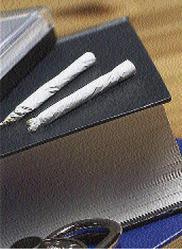
Ellen Campbell -Grizzle
From country
The small town centre is nestled between hills dotted with mansions in a rural community in Jamaica. The visitor first experiences the salubrious climate on the road that leads to the heart of this hamlet, 140 kilometres south of Kingston.
The team arrived on a Friday afternoon in response to an invitation from the teachers at the secondary institution in that community. The teachers had a major concern — students, particularly males, were not paying attention to school work, particularly after lunch time. In the school's opinion, ganja use was a problem.
The teachers arranged a session for the students with the prevention planners designed to test the waters. After a 15-minute presentation by the visitors, one young man, about 15 years old, rose with a towel around his neck. He told the group, to loud applause, that his father sold ganja to build his house and send them to school. He went on, "My grandfather smoke weed every day and still use machete to cultivate. All di big man dem a chat bout how ganja good, it is the healing of the nation. Oonu caan't tell wi nutten bout weed." The teacher glanced knowingly at the prevention team.
To town
The secondary school lies on the edge of Kingston in close proximity to a well-travelled highway. The teachers had a major concern - students, particularly males, were not paying attention to school work, particularly after lunch time. In the school's opinion, ganja use was a problem. The prevention planner was called in to address a senior class before designing an intervention. Ten minutes into the presentation, one male student, with head arched backward and mouth wide open, was asleep. "Young man," said the presenterstanding over him, "are you alright?" His eyes flickered open and he smiled. "Everyting irie, auntie," he said.
At the end of the session, a young woman, quietly approached the speaker, "Is a group of them, miss. Smoke ganja at lunch time, come to class and sleep. Teacher can't manage them."
Youth who do not use

The majority of Jamaica youth do not use drugs. Ganja use is confined to 24 per cent of experimenters with eight per cent reporting regular use. However, evidence shows that those who use ganja regularly among the adolescent population, underperform in school. The potential to engage in risky behaviours while under the influence increases. Teachers are very concerned about the impact of ganja use on the school careers and lives of abusers. Equally concerned are some young persons who see what is happening to their peers and want to do something to help.
Drug Awareness Month
November is Drug Awareness Month and there will be a national focus on drug abuse and its impact on Jamaican society. The subject of ganja use spurs a lot of talk at all levels as person's debate the pros and cons.
Persons who work in the field of drug abuse prevention have some remarkable experiences to share. Studies show, and experience bears out the fact, that where parents are engaged in the life of their children, the probability that drug abuse will derail their lives is extremely small. Jamaican parents need to do more to guide their children away from drug abuse. Jamaican teachers, demand reduction workers, young people and adults who serve as positive role models deserve commendation. If you are abusing any drug, it is time to 'give it up, live it up'.
Call the NCDA helpline at 1-888-992-4244.
Ellen Campbell Grizzle, president, Caribbean Association of Pharmacists; director, Information & Research, National Council on Drug Abuse; email: yourhealth@gleanerjm.com.

